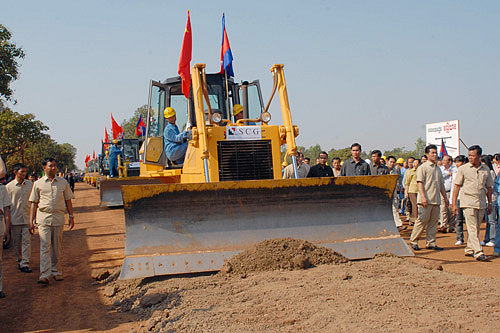|
 |
|
DEVELOPMENT ASSISTANCE: A bulldozer works at the ground-breaking ceremony for the restoration of Cambodia's National Road No. 62 in Kampong Thom Province on January 27. The project was funded by a concessional loan from the Chinese Government (LEI BAISONG) |
After the international financial crisis broke out, leading developed economies, including the United States, Europe and Japan, went into serious recessions. This was paired with major shakeups in the international financial market. China and other large developing countries managed to maintain rapid growth and helped stabilize the international financial market with practical actions. Their efforts were integral in preventing the world economy from falling into a massive depression, similar to the one in the 1930s.
What's more, a few major developed countries have long kept a low savings rate. Their excessive reliance on credit-supported consumption to maintain economic growth led to high fiscal deficits and soaring debts. As a result, when faced with weak private investment and consumption, the room for macroeconomic stimulus policies is quite limited. In developing countries, however, the savings rate is quite high. These countries can advance economic recovery through investment in infrastructure and research and development.
When it comes to balanced growth for the world economy, the world community should be most concerned with the development of these developing countries. The world economy's most fundamental imbalance is seen in contrasting levels of development. Although China, India, Brazil and other countries have taken great economic strides in recent years, they are still far behind developed countries.
The international community is obligated to address imbalances in the world economy by helping developing countries boost their development. And in the long term, balanced development of all countries provides an ultimate solution to problems such as current account and international investment imbalances.
Institutional support
As the global economy recovers from the crisis, the Group of 20 (G20) is entering a new stage in which it will place equal emphasis on growth and development.
In dealing with development issues, the G20 has distinct advantages. Its members are mainly developed countries, emerging economies and developing countries with a relatively high degree of industrialization. Their combined GDP accounts for 85 percent of the world's total. Although it is a powerful group, the G20 cannot neglect the well-being of other developing nations, which account for more than 85 percent of the world's countries.
The G20 has an obligation to provide political motivation, economic resources and institutional guarantees for the solution of the development problem. The G20, which includes the world's major donor countries, is able to channel more financial, technological and human assistance to developing countries.
Its summit in Toronto in June successfully promoted capital investment in development by the World Bank, the African Development Bank, the Asian Development Bank, the Inter-American Development Bank and other multilateral development banks. Their financial support to developing countries will increase from $37 billion to $71 billion per year.
What's more, in light of the huge challenge African countries face in economic and social development, the G20 advocated an increase in financial support for the African Development Bank. With the support of the G20, the African Development Bank's capital will record a 200-percent increase and its annual lending will be tripled.
Investment areas will extend to infrastructure construction, personnel training and the development of the private sector.
In addition, the G20 can further its efforts to adopt special trade measures in favor of developing countries, including trade financing, trade facilitation and trade-related assistance. | 